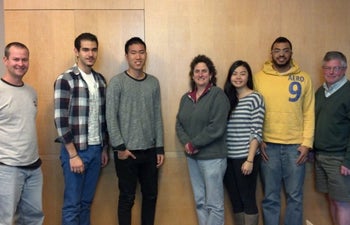Year of Research = Master’s
The USC Dornsife Department of Biological Sciences has launched a new progressive master’s degree in molecular genetics and biochemistry. The program gives students an opportunity to earn a graduate degree and immerse themselves in a research project by adding a year of study to their undergraduate program.
During their senior year, students in the progressive degree program take graduate-level electives that count toward their master’s degree followed by a year of focused research with limited coursework.
Overall, the program will provide students with a strong foundation in research, something that will be beneficial for students planning to attend medical or dental school, or those interested in careers in the pharmaceutical or biotechnology industries.
“The progressive degree is very similar in many respects to a first year Ph.D. program. Students will get the experience of managing their own research project. And they’ll be well-prepared for any graduate program and understand what research involves,” said Susan Forsburg, professor of biological sciences in USC Dornsife, who led the effort to develop the new progressive degree program, and serves as its director.
Research opportunities are as diverse as the molecular genetics and biochemistry projects being conducted at schools across the university — from USC Dornsife to the USC Davis School of Gerontology to Keck School of Medicine of USC.
To apply, undergraduates must have already performed research with their prospective faculty mentor, who will support their project and supervise their research. Generally, students will be admitted to the program each year with applications due Spring semester of a student’s junior year. The application deadline is March 1 at 5 p.m.

The first cohort of students in the molecular genetics and biochemistry progressive master’s degree program gather with their faculty mentors. From left, advisory committee member Matthew Dean of biological sciences; students Haig Aintablian and Eric Chung; Susan Forsburg, advisory committee chair; students Michelle Banh and Lloyd Camper; and advisory committee member Steve Finkel of biological sciences. Not pictured: students Michael Renteln and Steven Barnes. Photo courtesy of Susan Forsburg.
Michelle Banh, a senior majoring in health and humanity in USC Dornsife, is part of the inaugural cohort of students in the program, which launched Fall of 2012. She plans to pursue a career in pediatric surgery and sees the degree’s research emphasis as a way to gain a comprehensive perspective as a doctor.
“I think that sometimes we forget that as doctors we will be prescribing medications or following a particular protocol because someone in the lab has made a discovery,” Banh said. “Research is a great way to see both ends of healing on the medical spectrum.”
For her project, Banh is studying a gene called Ibp1 — itty-bitty phosphatase — to understand how it interacts with other genes to regulate cell growth. Forsburg is her adviser. The project is part of the larger research in Forsburg’s lab, but Banh will have a great deal of autonomy on the project.
“All of the bench work and everything, I will be doing all of that myself,” Banh said. “I’m collecting the data, and I’ll be analyzing the data myself and processing it for Dr. Forsburg.”
Banh said she is also motivated by the possibility of having her research published in a peer-reviewed academic journal. Students in the program are required to write a summative paper on their research due Spring of their master’s year of study.
“Our ideal would be that everyone walks out with a published research paper,” Forsburg said.
Forsburg also sees the program as a way to build scientific awareness for students whose careers may not end up in a laboratory or clinic.
“Increasingly, we see science is changing, and how we’re performing it is changing,” Forsburg said. “People who have a very strong sense of what the scientific process are going to be critically important, not just as potential researchers and clinicians, but as policymakers, educators and informed citizens.”
Learn more about the progressive master’s degree in molecular genetics and biochemistry. Applications for Fall 2013 are due March 1 at 5 p.m. Students who wish to apply may contact Hayley Peltz at hpeltz@dornsife.usc.edu or 213-740-5188.
For information about additional progressive degree programs in USC Dornsife visit dornsife.usc.edu/progressive-degree-programs.